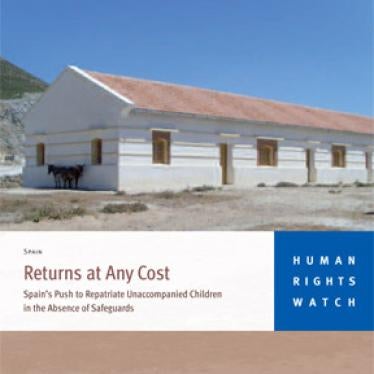It is now almost four years since 30,000 migrants arrived in the Canary Islands, the first EU landfall for boats from West Africa. Since then Spain has repatriated most of them or transferred them to the mainland, and the number of new immigrants has fallen. However, some 500 unaccompanied children remain – children who, under Spanish and international law, are entitled to special protection from the state.
In 2007, I documented how Spain was failing to protect the rights of the roughly 1,000 unaccompanied children then on the archipelago. I recently returned – in part because Spain says one of the priorities of its EU presidency is to adopt an action plan to improve the care and protection of unaccompanied children.
What I found was a disappointment. More than 200 children remain housed in three large emergency centres; the largest and the worst is home to 100.
La Esperenza is not, though, like a home – it is more like a prison. It is a previously abandoned detention facility tucked away in the woods leading up to Mount Teide on Tenerife. The centre has no heating system, has too few blankets and only limited hot water – and, in winter, the temperature falls close to zero. The food is poor and the staff say they themselves do not eat it, to avoid falling ill.
All three centres confirm the rule that peer violence and sub-standard institutions go together, and that the more children are housed there, the greater the risk.
There have been improvements, particularly at the Arinaga centre, which now holds 50, rather than almost 200, children. Younger and older children are separated; and the children are now enrolled in schools and vocational training programmes in the community.
Supervision of these centres seems more frequent, but remains insufficient. The centres offer the children no possibility of filing confidential complaints, and one boy said the centre director sanctioned children for calling in the police over a violent incident.
The Canary Islands are providing a minimum of care while they are children, but the day these children turn 18, the vast majority are kicked out onto the streets and into a life of almost inevitable homelessness and irregularity.
Even the island's government agrees that the level of care is inadequate. The government can run a better system – it has proven that. The roughly 300 other unaccompanied children live in about 20 small centres, where care is reasonable and the children have a chance to integrate themselves into the local community. The 200 in emergency centres should be moved to such places. But the local government says it cannot do so as the municipalities object. That does not explain why it has closed existing small centres.
Years ago, the Canary Islands declared it could cope with only 300 unaccompanied migrant children and, rather than prove otherwise, the local government appears to be keeping emergency centres open to put pressure on Madrid to transfer them to the mainland. This policy has succeeded to some extent, but the stand-off persists. With no definite plan to close down the emergency centres, children may remain in limbo for years.
Madrid should press for the centres' closure, attaching this as a condition for its financial support (Madrid covers more than half the roughly €2,000 that it costs to care for a child each month).
As it is, Spain is failing its international obligations to ensure all children are treated equally, to act in children's best interest, and to protect them from the risk of violence. Until Spain addresses these shortcomings, it will lack the moral authority to lead Europe politically on the issue of unaccompanied children.








